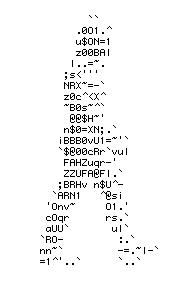Blogger und Journalisten - Blogosphere Crackpots und Culture Clashes?
Jeff Jarvis von Buzzmachine hatte allen Grund sich über Journalisten zu ärgern. Aber der Reihe nach:
Von Nieman Reports erhielt er die Anfrage, einen Artikel über Weblogs zu schreiben. Gesagt getan. Hier der Text.
Nachdem er den Text zum "Gegenlesen" eingesandt hatte erhielt er ihn mit folgenden "Korrekturen" zurück (nur ein Ausschnitt):
: I said that weblogs have the "potential to unlock a treasure of audience content."
: She said, "a treasure of audience interactivity."
: And that's essentially insulting to weblogs; it devalues them. This isn't just another way to chat, damnit. This is content as much as any newspaper's or magazine's content.
: I said: "Weblogs are conversation."
: She said, "Weblogs are a tool for creating conversation."
: There's a difference. Again, this isn't just another community tool. It's a content tool. Besides, her sentence was wordier. First rule of editing: Take words out, don't add them in.
: I said: "Weblogs can also change the world."
: She said: "Weblogs ... can also expand the way we think about and experience events around the world."
: Well, that's poorly stated and wimpy and wordy and it's not what I said. I meant what I said. This isn't about viewing the world. It's about changing the world. Again, the apparent aim is to defang weblogs.
: I said: "Weblogs are revolutionary."
: She said: "In Iran and other nations where people are repressed, we are learning that Weblogs can be tools of revolution."
: Once again, wordy and obtuse and diluted. Weblogs are revolutionary much closer to home -- in America ... and in newsrooms.
I said, "Now I don’t intend to engage in a debate about whether webloggers will replace reporters; that’s at least as tedious as a J-school seminar on objectivity."
: She took out the J-school line.
: Thus my joke turned into a haughty declaration and I turned into an asshole. Second rule of editing: Never make your writers look like assholes -- unless you pay handsomely for the privilege. And, by the way, we wouldn't want to joke about J-school, would we?
Das war ihm genug und er beschloss, den Artikel zurückzuziehen. Mit folgenden Begründungen:
So when I got the "edit" back, I responded by simply asking to kill the piece. I would have left it at that: time wasted. But then I got this most irksome email: "I knew that when we set out to do this project there might be a culture clash between the more staid journalism world (which I guess we tend to represent) and blogosphere, and I think you and I might have stumbled into that clash."
Whoa right there! I am a journalism executive, a writer and an editor, J-school trained, even; check the about me. My DNA is filled with pulp paper and slick ink and TV dots; I'm a damned journalism gray-beard (albeit prematurely gray, of course). I have unique experience living in both worlds, old and new. Yet here she was treating me like some blogosphere crackpot. Culture clash? I was insulted at the notion.
But maybe there is a culture clash, more than I knew or would admit. Journalism still needs to escape its closed, think-tank think and get out there and use the tools the audience is using. They need to read what the audience is writing. They need to listen. That's what is so damned exciting about weblogs. Weblogs give you the chance to hear your audience and what they really care about -- if only you are ready to listen.
Recht hat er,...und irgendwie kommt mir das alles so "verd..." bekannt vor. .. ...und um es mit einigen Zeilen von Randy Newman auszudrücken:
They would not listen; they did not know how--
Perhaps they'll listen now....
oder eher:
They would not listen; they're not listening still--
Perhaps they never will.....
Hier geht's zum vollständigen Eintrag: A world without editors
Von Nieman Reports erhielt er die Anfrage, einen Artikel über Weblogs zu schreiben. Gesagt getan. Hier der Text.
Nachdem er den Text zum "Gegenlesen" eingesandt hatte erhielt er ihn mit folgenden "Korrekturen" zurück (nur ein Ausschnitt):
: I said that weblogs have the "potential to unlock a treasure of audience content."
: She said, "a treasure of audience interactivity."
: And that's essentially insulting to weblogs; it devalues them. This isn't just another way to chat, damnit. This is content as much as any newspaper's or magazine's content.
: I said: "Weblogs are conversation."
: She said, "Weblogs are a tool for creating conversation."
: There's a difference. Again, this isn't just another community tool. It's a content tool. Besides, her sentence was wordier. First rule of editing: Take words out, don't add them in.
: I said: "Weblogs can also change the world."
: She said: "Weblogs ... can also expand the way we think about and experience events around the world."
: Well, that's poorly stated and wimpy and wordy and it's not what I said. I meant what I said. This isn't about viewing the world. It's about changing the world. Again, the apparent aim is to defang weblogs.
: I said: "Weblogs are revolutionary."
: She said: "In Iran and other nations where people are repressed, we are learning that Weblogs can be tools of revolution."
: Once again, wordy and obtuse and diluted. Weblogs are revolutionary much closer to home -- in America ... and in newsrooms.
I said, "Now I don’t intend to engage in a debate about whether webloggers will replace reporters; that’s at least as tedious as a J-school seminar on objectivity."
: She took out the J-school line.
: Thus my joke turned into a haughty declaration and I turned into an asshole. Second rule of editing: Never make your writers look like assholes -- unless you pay handsomely for the privilege. And, by the way, we wouldn't want to joke about J-school, would we?
Das war ihm genug und er beschloss, den Artikel zurückzuziehen. Mit folgenden Begründungen:
So when I got the "edit" back, I responded by simply asking to kill the piece. I would have left it at that: time wasted. But then I got this most irksome email: "I knew that when we set out to do this project there might be a culture clash between the more staid journalism world (which I guess we tend to represent) and blogosphere, and I think you and I might have stumbled into that clash."
Whoa right there! I am a journalism executive, a writer and an editor, J-school trained, even; check the about me. My DNA is filled with pulp paper and slick ink and TV dots; I'm a damned journalism gray-beard (albeit prematurely gray, of course). I have unique experience living in both worlds, old and new. Yet here she was treating me like some blogosphere crackpot. Culture clash? I was insulted at the notion.
But maybe there is a culture clash, more than I knew or would admit. Journalism still needs to escape its closed, think-tank think and get out there and use the tools the audience is using. They need to read what the audience is writing. They need to listen. That's what is so damned exciting about weblogs. Weblogs give you the chance to hear your audience and what they really care about -- if only you are ready to listen.
Recht hat er,...und irgendwie kommt mir das alles so "verd..." bekannt vor. .. ...und um es mit einigen Zeilen von Randy Newman auszudrücken:
They would not listen; they did not know how--
Perhaps they'll listen now....
oder eher:
They would not listen; they're not listening still--
Perhaps they never will.....
Hier geht's zum vollständigen Eintrag: A world without editors
Cyberwriter - 23. Jul, 18:25 - Blogging
3 Kommentare - Kommentar verfassen - 0 Trackbacks





















